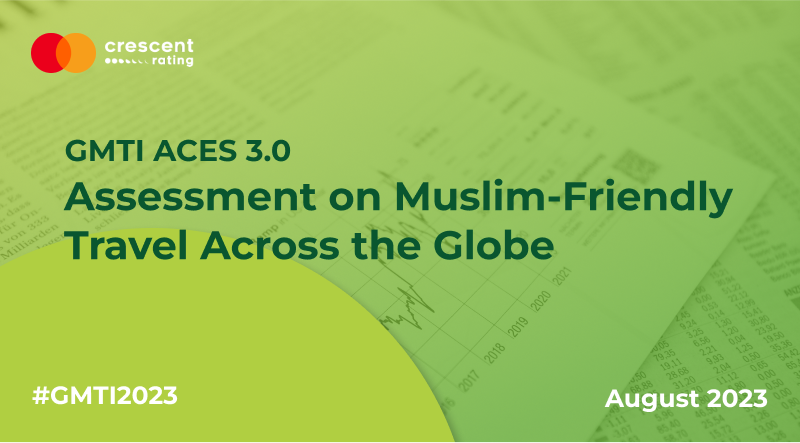
The demand for Muslim-friendly travel destinations is rising in a rapidly global world. To cater to this growing market and ensure a more inclusive experience for Muslim travelers, the Global Muslim Travel Index (GMTI) employs the ACES 3.0 Framework. Introduced in 2017, this comprehensive model assesses various aspects of a destination's travel facilities and services, categorized into Access, Communications, Environment, and Services.
The ACES Framework employs quantitative measurements across various criteria and sub-criteria. Scores are derived from over 50 data sets compiled using the ACES 3.0 Framework, with updates to reflect industry growth and changing travel trends. This year's model enhances the Environment category, strengthening "Sustainability" metrics through comprehensive data analysis and completely overhauling "Enabling Climate" data.
The first pillar of the ACES 3.0 Framework is Access, which evaluates how easily Muslim travelers can reach their chosen destination. The Access criteria analyze factors such as air connectivity, land connectivity, visa requirements, and transport infrastructure quality. By considering these elements, the framework provides essential insights into the accessibility of a destination from the top 30 Muslim travel outbound markets.
Air connectivity is a key aspect, as it assesses the availability and frequency of direct flights between the destination and important Muslim outbound markets. Additionally, the distance between destinations is considered, recognizing that shorter travel distances can significantly contribute to ease of access. Land connectivity evaluates the quality of road networks and border crossings, facilitating smooth travel to and from Muslim-majority areas.
Visa requirements are crucial in determining a destination's appeal to travelers. The ease of obtaining visas and specific provisions for Muslim visitors are evaluated. Furthermore, the assessment encompasses the quality, efficiency, and variety of transport options within the destination itself, ensuring a hassle-free experience for travelers.
The Communication criteria evaluate how destinations effectively communicate with Muslim travelers. It comprises three key factors: Communication Proficiency, Destination Marketing, and Stakeholder Awareness.
Communication Proficiency is assessed based on a destination's proficiency in communicating in the top 10 languages spoken by Muslim travelers, including English, Arabic, Bahasa, Malay, Urdu, Turkish, Russian, French, Persian, and German. Through multilingualism, destinations can better engage with and cater to Muslim visitors.
Destination Marketing is a vital aspect that examines how well a destination promotes its Muslim-friendly services and facilities. This includes providing comprehensive and accurate information on websites, dedicated Halal travel guides, media mentions, and effective promotional campaigns. Effective destination marketing attracts Muslim travelers and showcases the destination's commitment to catering to their specific needs.
Stakeholder Awareness is a crucial factor that reflects how well local communities and businesses understand and address the needs and preferences of Muslim travelers. Destinations with a higher level of stakeholder awareness tend to create a more informed, welcoming, and accommodating environment for Muslim visitors.
The Environment criteria assess a destination's overall atmosphere and appeal to Muslim travelers. It comprises several key factors, including Enabling Climate, Faith Restrictions, General Safety, Muslim Visitor Arrivals, and Sustainability.
Enabling Climate evaluates a destination's ability to foster innovation and entrepreneurship, particularly in the context of climate change. Factors such as policy frameworks, access to finance, and innovative capacity are considered to create a conducive environment for sustainability-related endeavors.
Faith Restrictions examine whether any limitations or restrictions are imposed on Muslims regarding religious practices. This includes dress code restrictions for Muslim females, which can significantly impact Muslim travelers' overall experience and perception of a destination.
General Safety encompasses various aspects, including hate crimes and overall security. Ensuring a safe and secure environment for Muslim travelers is essential to guarantee a peaceful and enjoyable visit.
The number of Muslim Visitor Arrivals reflects the level of appeal and suitability of the environment for this specific group. Higher visitor numbers indicate a destination's ability to cater to Muslim travelers effectively.
Sustainability is of paramount importance to travelers as they align their travel choices with ethical considerations and values. The assessment of sustainability efforts, such as CO2 emissions, renewable energy usage, air quality, heritage preservation, and human development, helps create a more favorable environment for travelers.
The Services criteria assess the range and quality of services available to Muslim travelers within a destination. This encompasses several key factors, including the availability of prayer places and mosques, the availability of halal dining options, Muslim-friendly airports, Muslim-Friendly accommodations, and heritage experiences and Attractions.
The availability of prayer places and mosques evaluates the presence and accessibility of prayer facilities within the destination. This includes designated prayer rooms, mosques, and other prayer spaces, ensuring Muslim travelers have convenient locations to fulfill their religious obligations.
The availability of halal dining options is crucial for catering to the dietary requirements of Muslim travelers. Destinations that offer various Halal-certified food options or Muslim-friendly restaurants enhance the travel experience significantly.
Muslim-friendly airports consider the availability of prayer rooms, ablution facilities, and Halal food options. Airports catering to Muslim travelers' comfort and needs make a significant difference in their overall journey.
Muslim-Friendly accommodation assesses the availability of hotels, resorts, and lodging establishments that offer amenities and services tailored to the needs of Muslim travelers. Suitable accommodations are key to ensuring a pleasant and enjoyable stay.
Heritage experiences and attractions examine the availability of historical and cultural landmarks significant to Muslim travelers. Exploring these attractions allows Muslim visitors to connect with their faith and heritage.
The GMTI ACES 3.0 Framework is an invaluable tool for destinations seeking to attract and cater to the burgeoning Muslim travel market. By focusing on Access, Communications, Environment, and Services, this comprehensive model ensures a more welcoming and accommodating experience for Muslim travelers worldwide. As destinations strive to enhance their accessibility, communication efforts, environment, and service offerings, they contribute to creating a more inclusive and diverse global travel landscape.
Visit this link to download the GMTI 2023 full report!